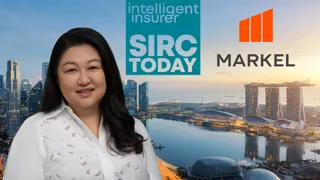
How Markel is insuring China’s AI-driven economy
China’s technology boom is rewriting the risk map, and Markel is moving fast to stay ahead, Chelsea Jiang tells SIRC Today.
Key points"
Drones and AI redefine China’s risks
Markel launches digital asset coverage
Carbon credits next on Markel’s radar
China’s fast-moving technology ecosystem is reshaping the insurance market in real time. As new applications from autonomous ports to crypto exchanges gain scale, Markel is positioning itself to provide the specialist cover these innovations demand.
For Chelsea Jiang, managing director of Markel Greater China, this landscape presents “a huge growth opportunity, and a whole new spectrum of risk never dealt with before”.
Few markets showcase the collision of technology and risk quite like China, and the pace of adoption is dazzling. “We’re seeing not just technology in research and development,” Jiang told SIRC Today, “but real-life applications that are changing risk as we know it.”
She pointed to one example already taking off: the low-altitude economy. “If you go to cities in China such as Shenzhen, you can get your food delivered by a drone,” Jiang said. “You think that’s unbelievable, but that’s what’s happening right now.”
The space between urban rooftops and commercial air routes is now populated by drones completing hundreds of deliveries every hour. Another area where adoption has been very quick is AI-operated autonomous ports and terminals.
Previously run by people, these ports now rely on AI to manage cranes, containers and cargo flows. For underwriters, Jiang believes, the key is to break down each new risk logically.
“First, ask where the technology is applied. Then ask if we understand the fundamental operational risk in its previous format. Other questions to find answers to concern the actual original goals of adopting AI, and how the risk is being monitored and improved.”
It’s a framework rooted in clarity. “It’s not something so daunting that you can’t digest,” she said. “The process is the same: understand the risk, the intent and the management behind it.”
Markel’s long experience in the region gives it a head start. “We’ve been in Greater China for over 15 years, and our Shanghai office is celebrating 10 years,” Jiang explained. The company began with professional and financial risks (PFR) and now employs a team of six underwriters dedicated to that portfolio. The result is a strong base of insight into emerging financial exposures, including digital assets.
“Only a few months ago, we launched our cryptocurrency proposition,” Jiang stated. “We’re perhaps one of the only licensed general insurers in Greater China with a direct proposition for cryptocurrencies and digital assets.”
As Hong Kong rolls out new licensing and stablecoin schemes, Jiang expects more major financial institutions to incorporate digital assets into their operations. Markel has also developed a fintech policy tailored to technology firms supporting financial institutions. Hong Kong’s open and competitive insurance market makes it a natural base for growth.
“We’re seeing real-life applications that are changing risk as we know it.”
“There are over 180 licensed insurers here, and even the largest has less than 10% market share. It’s a market that welcomes competition and diversity,” Jiang noted. “We’re not trying to be everything to everyone, but for what we do—tech, financial lines, fine art and marine—we can have a very strong footprint.”
Innovation is embedded in the company’s product pipeline, according to Jiang. Beyond crypto and fintech, Markel is exploring coverage for carbon credits; an emerging financial asset class linked to sustainability.
As AI adoption accelerates, insurers face the dual task of understanding new exposures and creating affirmative coverage for them. “Today, many policies probably cover elements of AI by default, but not positively,” Jiang commented. “We want to get to a place where clients don’t have to worry if an AI-related incident would be covered, because they’ll know it is.”
The real challenge, for Jiang, lies in mindset. “Can the industry shift from thinking about historical data to understanding future exposure? At Markel, when we hire, we look for underwriters with the ability to assess future risks rather than rely on preset tools.”
Ultimately, insurers must remember the positive intent behind innovation. “Our customers adopt technology to make their businesses better. They wouldn’t use it if it didn’t give them that improvement.
“If you’re willing to have that mindset, go on that journey with the client and truly understand how clients are evolving, then you’ll stay relevant in a space that’s developing very quickly.”
Chelsea Jiang is managing director of Markel Greater China. She can be reached at: chelsea.jiang@markel.com.
For more news from SIRC Today, click here.
Did you get value from this story? Sign up to our free daily newsletters and get stories like this sent straight to your inbox.
Editor's picks
Editor's picks
More articles
Copyright © intelligentinsurer.com 2024 | Headless Content Management with Blaze

